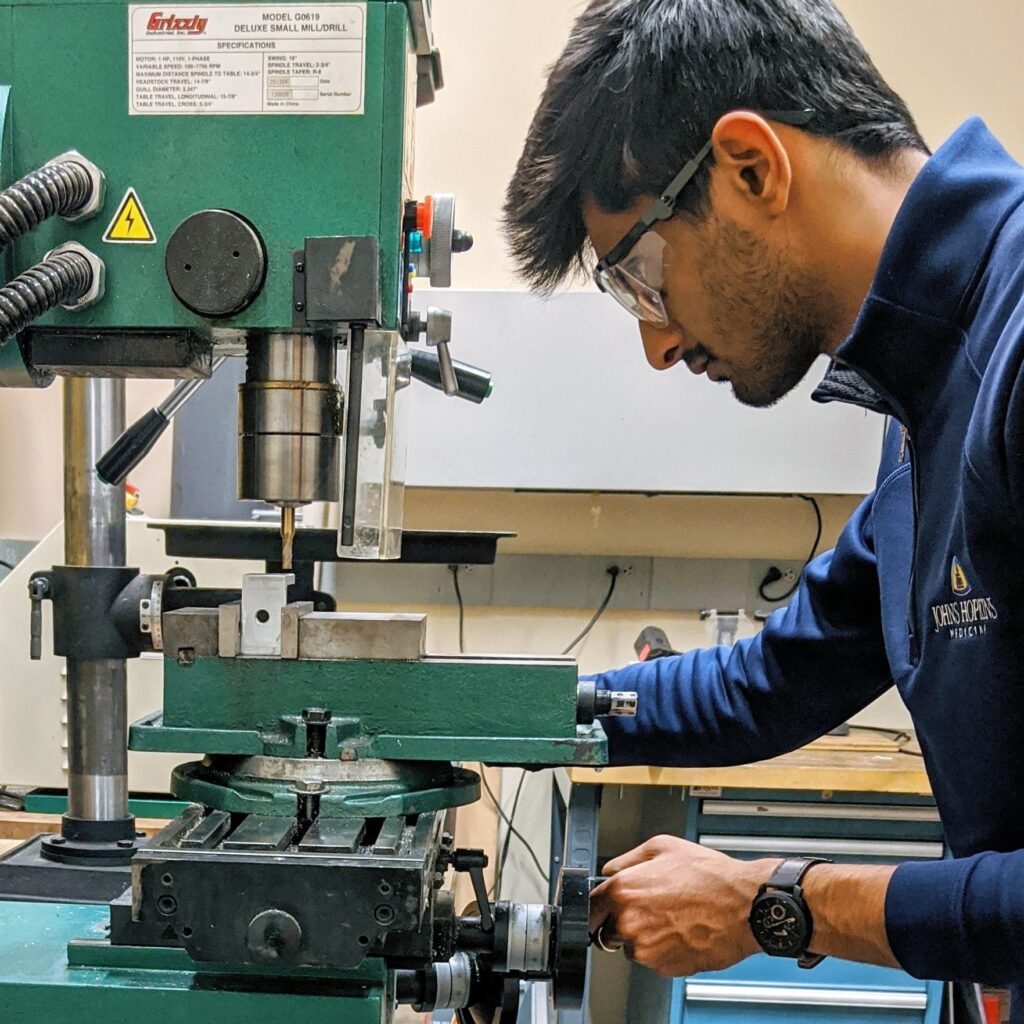In September, Mohit Singhala, PhD, joined the Department of Otolaryngology-Head & Neck Surgery as Research Assistant Professor. He is the lead engineer in Pittsburgh CREATES, where he focuses on healthcare innovation.
He sees his role as having two primary components: technical collaboration and building innovation programs.
“I am a big believer in the principle of ‘first order retrievability’ – to get things done and do them right, you want easy access to your most critical resources,” he said. “By creating a prototyping space and offering technical expertise at the heart of the medical campus, I hope we can build strong partnerships with innovators, enabling quick iterative development of innovative ideas and research concepts. It’s important for providers to know there is a place nearby they can walk to, to share their insights and ambitions, brainstorm ideas, have materials to build, find collaborators, and access a broader set of perspectives.”
Program-wise, Dr. Singhala’s focus is to help create a common language and set of tools that innovators from the university’s many different departments can use to collaborate effectively. He explained that these tools will help innovators develop an understanding of the problem and criteria for what a solution would look like. They also help factor in the regulatory, clinical, technical, and commercial constraints as the ideas are developed.
“We aim to leverage my background in user research and engineering, with Dr. Peter Santa Maria’s background in life sciences, medicine, and translation for the same,” he said. “We will also actively engage with the Office of Innovation and Entrepreneurship to understand innovators’ needs and create programs to support their efforts.”
Dr. Singhala was born and raised in India, where he obtained his bachelor’s in mechanical engineering. In 2016, he went to Johns Hopkins to obtain a Masters in Bioengineering Innovation and Design, followed by a PhD focused on haptic perception and medical robotics.
Prior to his current position, Dr. Singhala was an Innovation Fellow at the Stanford Mussallem Center for Biodesign for the last two years. In 2022-2023, he was part of a 12-fellow multidisciplinary cohort trained in the Biodesign process for innovation and translation of healthcare solutions. In 2023-2024, through a Gates Foundation funded initiative, he focused on applying this process in India to identify and find solutions to unmet needs in maternal health. He has developed healthcare innovations in various specialties, across many geographies, including Asia, East Africa, and North America.
Dr. Singhala considers himself extremely fortunate to have learned the best practices of healthcare innovation from mentors at CBID, Johns Hopkins, and Biodesign, Stanford, who are “pioneers in this field with decades-long history of real-life outcomes.” He was drawn to this opportunity to try and emulate some of their success, “creating a program that is specific to the needs and strengths of the Pittsburgh ecosystem.”
Dr. Singhala also praised providers and researchers at Pitt and UPMC for their legacy of being innovative, especially in life sciences and surgery. His conversations with Drs. Zevallos, Santa Maria, and Snyderman helped him appreciate the university’s commitment and specifically the Department of Otolaryngology-Head & Neck Surgery to translate that native inventiveness to even greater patient impact. He was also encouraged by the enthusiasm and active involvement from the Office of Innovation and Entrepreneurship and the Eye & Ear Foundation.
Dr. Singhala’s primary goal for CREATES is to be a place where anyone who is curious enough to challenge the current standard of care can feel optimistic about using their skills to drive positive change in the healthcare system. He hopes to see innovations come out that achieve success in the traditional commercial sense, as well as innovations that help improve things at a Department level, like new tools for trainees; innovations that cater to the Pittsburgh community; and innovations that effect change on a global scale, especially in low and middle income countries.
For CREATES to be successful, Dr. Singhala said they will need support of experts spanning multiple disciplines like design, engineering, medicine, public health, regulatory, business, social work, and policy. “For now, I check the boxes on user research and prototyping, which helps us kickstart the process,” he said. “But if we do things right, the programs we put in place should scale effectively, over time, across fields and geographies.”
People who are passionate about contributing to the healthcare innovation ecosystem in Pittsburgh in any capacity, from any background – even without an academic or Pitt affiliation – can fill out a Google form or email mohit.singhala@pitt.edu.
